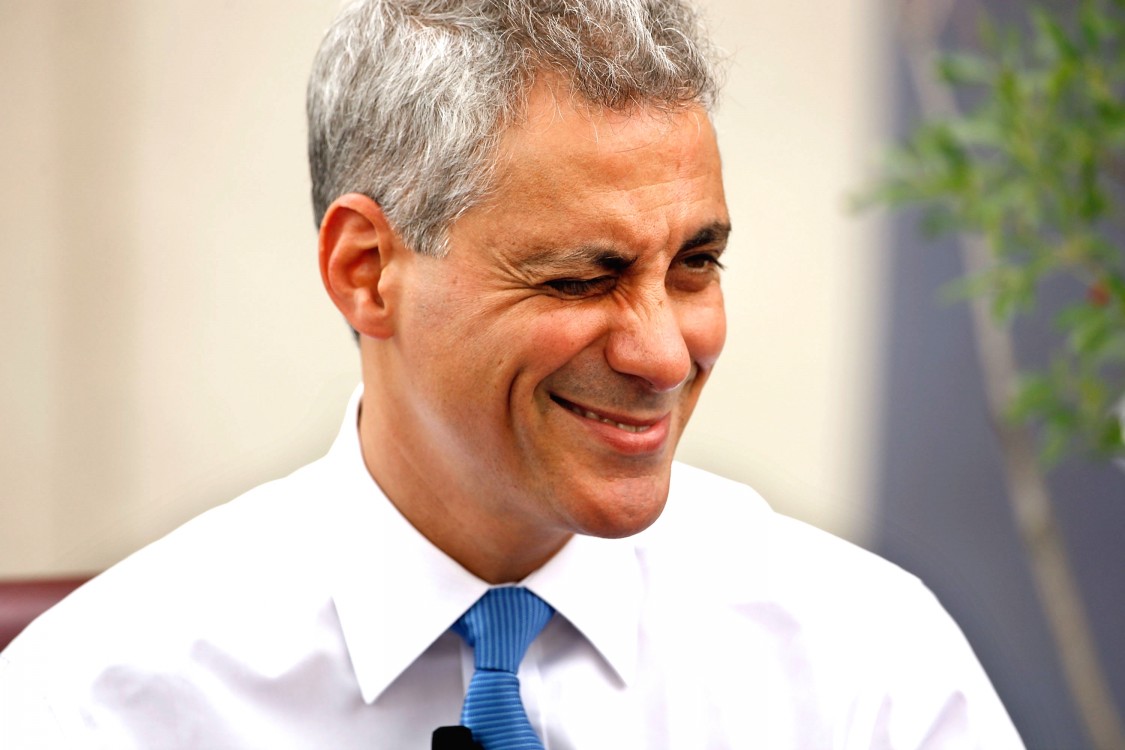
Eric Wagner isn’t the kind of person one might expect to find at a rally for Democratic mayoral candidate Jesús “Chuy” Garcia. “I’m a white, middle-class, Eisenhower Republican,” Wagner said.
Yet Wagner, 42, a high school history teacher and U.S. Army veteran, was attending the event in Chicago’s Logan Square neighborhood because, he said, Mayor Rahm Emanuel is out of touch with the problems of the city’s less affluent South Side and West Side.
“He basically wants to be a mayor for every person in this city,” said Wagner of Garcia. “It’s refreshing.”
Emanuel, by contrast, has prioritized the downtown lakefront, dominated by high-rise corporate headquarters, luxury hotels and a sprawling convention complex and ignored the rest of the city, his critics say. Garcia supporters say that strategy has failed to reduce violent crime or produce a meaningful economic plan to jump-start sustainable manufacturing jobs in areas pockmarked by swaths of empty factory campuses.
Now a report that Emanuel’s administration invested money from the city’s teachers’ union in private equity funds run by some of the mayor’s biggest campaign donors is adding fuel to the charges that he neglects all but his wealthy backers.
Emanuel, who failed to secure more than 50 percent of the vote during last month’s open primary, faces an April 7 runoff against Garcia, 58, a Cook County commissioner and former Illinois state senator. Garcia is trailing in polls; a Chicago Tribune poll released last week showed him with 37 percent of the vote, compared with Emanuel’s 51, with 11 percent of voters undecided.
But Garcia’s Mexican immigrant roots have galvanized support among many minority voters and some of their most visible leaders, such as the Rev. Jesse Jackson and U.S. Rep. Danny Davis. And Garcia is also bridging the gap with white progressives who are friendly toward unions and question Emanuel’s Democratic Party credentials. Emanuel has made little secret of his connections to Wall Street power brokers and shared financial sector history with Bruce Rauner, Illinois’ first Republican governor in 12 years.
Ethics Cloud
No single issue has strengthened this coalition more than Emanuel’s decision in 2013 to shutter nearly 50 public schools, primarily in the city’s poorest areas. This made the Chicago Teachers Union (CTU) his largest foe and prompted the American Federation of Teachers to funnel more than $350,000 to Garcia in an effort to offset the nearly $18 million Emanuel has already spent in the race.
Emanuel’s standing among educators worsened recently when The International Business Times reported that the administration has invested CTU pension money in firms such as Grosvenor Capital Management, a multibillion-dollar hedge fund run by top Emanuel adviser Michael Sacks, and GTCR, a private equity firm founded by Rauner. Both firms are significant donors to Emanuel, with Grosvenor his top patron, giving $1.1 million to his campaign.
Critics say the investments could run afoul of the U.S. Securities and Exchange Commission prohibition on pay-to-play influence peddling. Emanuel also made ethics reform a central theme during his first campaign and signed an executive order in 2011 barring political donors from receiving city contracts.
Last year, however, his appointed ethics commission issued a legal opinion that said pension systems are exempt from city ethics laws because they “are not agencies or departments of the city and … are not doing or seeking to do business with the city.” Also last year Emanuel moved to require city workers to pay more into their pension benefits to provide relief for the troubled, underfunded system.
Emanuel’s campaign representative would not respond to a request for comment for this article. The office also declined to provide a comment for the International Business Times story.
The CTU is demanding that Emanuel return the millions in campaign money from the firms in question. “There’s only one real way for him to remove scrutiny and suspicion from what is really going on here,” said union spokesman Jackson Potter, “which is to divest and ask donors to take back their money.”
J. Fred Giertz, an economist at the University of Illinois at Champaign-Urbana, said pay-to-play schemes involving public pension investments are often extremely difficult to prove at the boardroom level because doing so requires definitive proof that favors were exchanged.
“If they are outright cheating, you won’t know that. It’s very hard to find a direct link. The pension board is going to say these firms are good firms and they had the most attractive bid,” Giertz said. “The pension board is supposed to be insulated from politics, but sometimes they aren’t.”
Nevertheless, a coalition of City Council members has asked the SEC to investigate. “We’re not giving up on it. It’s about cleaning up the city, because this is the origin of all our problems. If the guy at the top commits all this unethical behavior and shrugs it off, it says we can all do that. And we can’t,” said Alderman Scott Waguespack.
Inequality Gap
At a debate with Garcia on Monday, Emanuel was not asked directly about the pension fund investments. He attacked his opponent for voting for a 1997 state education bill that allowed Chicago Public Schools to skip some annual payments and said Garcia did not have a firm plan for dealing with the school pension crisis.
The mayor’s plan to pay down the pensions includes a sales tax increase and the possibility of a lakeside casino. In the debate, Garcia said he would not rule out any new taxes. Neither candidate addressed specifics about how he would tackle the city’s $20 billion pension crisis.
Emanuel has countered with television ads that admit he “can rub people the wrong way” while touting school reform and a commitment to hiring more minority contractors. When a February Chicago Tribune poll asked likely voters how much attention Emanuel has given to economic development in their neighborhood, 60 percent said not enough.
Investing in the neighborhoods is key to narrowing the inequality gap and bettering the schools. Garcia has said he would end many programs started by Emanuel — including the push for charter schools and the controversial use of cameras to enforce traffic laws — but doing so would likely require raising taxes.
Kent Redfield, a political scientist at the University of Illinois at Springfield who specializes in campaign financing, said Emanuel has not helped his case for re-election by creating conflicts like the one with the pension board.
“Even if you are in a gray area due to different ordinances or city’s regulations that may apply, you still shouldn’t take the money,” he said. “It may not be illegal, but it creates an ethics cloud.”
At a debate with Garcia on Monday, Emanuel was not asked directly about the pension fund investments. He attacked his opponent for voting for a 1997 state education bill that allowed Chicago Public Schools to skip some annual payments and said Garcia did not have a firm plan for dealing with the school pension crisis.
The mayor’s plan to pay down the pensions includes a sales tax increase and the possibility of a lakeside casino. In the debate, Garcia said he would not rule out any new taxes. Neither candidate addressed specifics about how they would tackle the city’s overall $20 billion pension crisis.
At a debate with Garcia on Monday, Emanuel was not asked directly about the pension fund investments. He attacked his opponent for voting for a 1997 state education bill that allowed Chicago Public Schools to skip some annual payments and said Garcia did not have a firm plan for dealing with the school pension crisis.
The mayor’s plan to pay down the pensions includes a sales tax increase and the possibility of a lakeside casino. In the debate, Garcia said he would not rule out any new taxes. Neither candidate addressed specifics about how they would tackle the city’s overall $20 billion pension crisis.
3 WAYS TO SHOW YOUR SUPPORT
- Log in to post comments

















